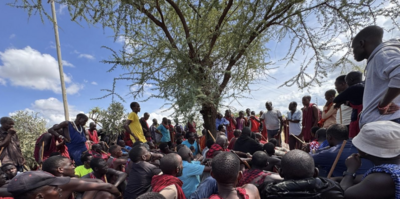 A section of Oldonyonyokie Group Ranch members in Kajiado County hold a meeting to oppose a carbon credits scheme on April 30, 2025. (Photo: Zeynab Wandati I Nation Media Group)The Nation | 4 June 2025
A section of Oldonyonyokie Group Ranch members in Kajiado County hold a meeting to oppose a carbon credits scheme on April 30, 2025. (Photo: Zeynab Wandati I Nation Media Group)The Nation | 4 June 2025Green grabbing: Lack of land rights promotes unjust climate action
By Wambui Mbuthia
Kenya recently suspended the Northern Kenya Rangelands Carbon Project, once the world's largest soil carbon removal effort, after a court ruled that its conservancies were established without sufficient public participation, violating the constitutional land rights of indigenous pastoralists. The court found that the project interfered with traditional grazing practices, a key economic activity for local communities.
Major corporations such as Netflix, Meta, and British Airways had already purchased tens of millions of dollars in carbon credits from the project. Still, the ruling exposed a troubling lack of consultation or consent from the communities whose land was used for carbon offsetting.
This case exemplifies a growing pattern across Africa, where land-based carbon offset projects expand rapidly without meaningful engagement with indigenous and local communities. These projects often bypass the Free, Prior, and Informed Consent (FPIC) principle, leading to marginalisation, displacement, and conflict. The resulting climate actions prioritise carbon metrics over people's rights in a new form of colonial-era land grabs.
A May 2025 report titled "Net Zero and Land Rights: How Our Climate Goals Drive Land Demand and Shape People's Lives" highlights this emerging global land rush. Jointly published by the Robert Bosch Stiftung and TMG Think Tank for Sustainability, it warns that climate strategies relying heavily on land-based carbon removal are triggering widespread land acquisitions, especially in the Global South.
Land-based carbon offsetting and the global land rush
Governments and corporations, driven by net-zero pledges to limit global warming below 2°C, increasingly depend on land-based carbon removal strategies such as reforestation and afforestation to offset emissions.
The report estimates that up to one billion hectares of land, an area roughly the size of the United States or China, may be required by 2060 to meet these commitments. This surge in land demand is concentrated in the Global South, where large tracts of land are suitable for carbon projects, but land tenure systems are often insecure or informal.
Indigenous Peoples and local communities hold customary rights to about 65 per cent of the world's land, yet only 10 per cent is formally recognised as theirs. This legal gap allows governments and private companies to negotiate land deals without the consent or compensation of rightful custodians, causing displacement, disruption of local food systems, and ecological degradation. Women face particular exclusion as they are frequently denied land tenure and access to benefits from carbon projects.
Dr Jes Weigelt, managing director of TMG, warns, "We can't build climate resilience through the carbon markets and climate targets driven land rush. Communities on the frontlines of the climate crisis are key stewards of forests, grasslands, and biodiversity." She concludes that secure land rights are essential for meaningful, just, and lasting climate action.
The report criticises the European Union for falling behind its ambitious land-based carbon removal targets and resorting to offsetting mechanisms perpetuating extractive environmentalism. Large-scale monoculture plantations replace biodiverse landscapes, while corporate projects risk displacing smallholder farmers and blocking traditional land uses, exacerbating social inequalities.
Head of Climate Change Team at Robert Bosch Stiftung, Dr Tabea Lissner, stresses: "Climate protection and measures will lose their legitimacy if they come at the cost of social justice. To achieve net-zero targets, we must simultaneously protect people's land rights in the Global South."
The report offers urgent recommendations to prevent these harms and center justice in climate policies. Governments must integrate recognition and protection of land tenure rights, including customary and traditional rights, in national climate policies, especially Nationally Determined Contributions.
The Free, Prior, and Informed Consent principle must be mandatory for all carbon offset projects to restore agency to indigenous peoples and local communities. This will enable meaningful participation in project design, implementation, and benefit-sharing.
Excluding women weakens adaptive capacity and undermines climate interventions. We must, therefore, embed gender equality in land tenure reforms and climate finance.
Carbon markets should move beyond commodified, technocratic solutions and adopt rights-based standards with enforceable grievance mechanisms. Land rights must be central to climate finance frameworks and monitoring protocols.
Senior Adaptation Advisor at Power Shift Africa Juma Ignatius notes that land issues in Kenya are longstanding. Many communities lack formal land titles, making them vulnerable to land acquisitions for carbon projects. Kenya's Community Land Act of 2016 was designed to safeguard communal land rights, but implementation challenges remain.
The Climate Change (Amendment) Act 2023 and the Climate Change (Carbon Markets) Regulations 2024 mandate Community Development Agreements for projects on communal land intended to outline benefit-sharing mechanisms. However, communities cannot often negotiate equitable terms, risking exploitation.
Kenya's updated Nationally Determined Contribution (NDC) emphasises reducing greenhouse gas emissions by increasing tree cover and achieving neutrality in land degradation. However, it lacks explicit provisions for land tenure security. Juma warns: "The absence of clear guidelines on land ownership and rights within the NDC framework raises concerns about potential land-related conflicts and marginalisation of indigenous communities."
The Robert Bosch Stiftung and TMG Think Tank's report underscores that land rights are foundational to effective and fair climate policies. Over-reliance on land as a carbon sink reflects a policy failure; the Global North must prioritise emission reductions domestically rather than exporting land burdens to vulnerable communities.












